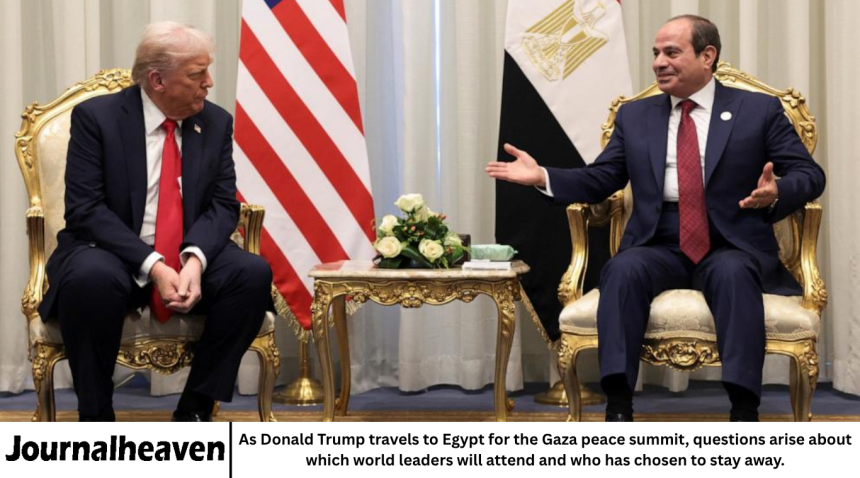The eyes of the world are turning toward Egypt as former US President Donald Trump heads to Cairo for what is being called the Gaza peace summit. The high-profile gathering is expected to bring together leaders, diplomats, and regional representatives in a renewed attempt to ease tensions and find a path forward for the war-torn Gaza Strip.
- The Purpose of the Gaza Peace Summit
- Why Egypt Is Hosting the Summit
- Who Is Expected to Attend
- Who Is Not Attending
- Trump’s Role in the Talks
- The Stakes for the Region
- The Humanitarian Urgency
- Global Reactions to Trump’s Visit
- Challenges Facing the Summit
- What Success Would Look Like
- Historical Context of Gaza Peace Efforts
- Regional Power Dynamics
- Media and Public Expectations
- Possible Outcomes of the Summit
- The Role of Trust in Diplomacy
- Frequently Asked Questions
- Conclusion
But as preparations continue, one major question dominates global headlines: who will attend — and who will stay away?
The summit comes at a critical time. The humanitarian crisis in Gaza remains severe, diplomatic relations are strained, and international leaders are under pressure to act. Trump’s arrival adds a layer of political and media attention, sparking both hope and skepticism about what this meeting might achieve.
The Purpose of the Gaza Peace Summit
The Gaza peace summit in Egypt aims to open new dialogue between regional powers and international stakeholders. The primary goals are to reduce ongoing violence, improve humanitarian access, and explore the possibility of long-term stability in Gaza.
Egypt, which has historically played a key mediating role in Israeli-Palestinian affairs, is once again positioned as the host of critical discussions. Cairo’s government hopes to use its diplomatic experience to bring together conflicting sides and push for agreements on aid corridors, border management, and ceasefire conditions.
For Donald Trump, this summit represents another opportunity to reassert his influence in global diplomacy. Having previously overseen the Abraham Accords — which normalized relations between Israel and several Arab nations — Trump is positioning himself as a dealmaker capable of achieving results others have not.
Why Egypt Is Hosting the Summit
Egypt’s involvement in the Gaza issue is both historical and strategic. As Gaza’s immediate neighbor, Egypt has long held a unique role as a mediator between Israel and Palestinian authorities. The Rafah border crossing, controlled jointly by Egypt and Gaza, remains a lifeline for humanitarian aid and civilian movement.
By hosting the summit, Egypt aims to reaffirm its status as a stabilizing force in the region. The country’s leadership believes that dialogue — even among rivals — is the only sustainable path toward peace.
At the same time, Egypt’s decision to invite Donald Trump underscores Cairo’s desire to engage both traditional and unconventional power brokers. With Washington’s influence still crucial to Middle East diplomacy, Egypt’s partnership with Trump could add momentum to a peace process that has stalled for years.
Who Is Expected to Attend
As of now, several key figures and nations are expected to attend the summit. Reports suggest that representatives from Israel, the Palestinian Authority, Egypt, Jordan, and the United States will be present. Delegates from the European Union and the United Nations are also expected to participate as observers.
Arab League members, including Saudi Arabia and the United Arab Emirates, have expressed tentative support for the talks, signaling their willingness to engage if the discussions focus on humanitarian relief and regional stability.
For many countries, participation in the summit is seen as a balancing act — an opportunity to contribute to peace efforts without appearing to take sides.
Who Is Not Attending
While some nations are eager to attend, others have chosen to stay away. Notably, Iran and Turkey — both influential players in regional politics — have reportedly declined formal invitations, citing concerns over the summit’s structure and Trump’s involvement.
Certain European countries have expressed cautious distance as well, preferring to observe from afar rather than commit diplomatically to a process still in early stages.
Humanitarian organizations, including several prominent NGOs, have voiced frustration at being left out of the main talks, arguing that any lasting peace plan must include direct input from those working on the ground in Gaza.
The absence of key regional powers poses a challenge. Without full participation, the summit risks producing statements of intent rather than actionable commitments.
Trump’s Role in the Talks
Donald Trump’s participation has sparked intense debate. Supporters view his presence as a bold move that could inject energy into a stalled peace process. Critics, however, see his involvement as politically motivated, suggesting it’s more about visibility than diplomacy.
Nevertheless, Trump’s record with the Abraham Accords shows he can achieve surprising results through direct engagement. His team reportedly plans to push for immediate humanitarian measures — such as aid delivery and temporary ceasefires — as short-term confidence-building steps.
Sources close to Trump’s delegation say his approach remains pragmatic. Rather than aiming for a sweeping final deal, he intends to encourage smaller, achievable actions that can restore dialogue and trust.
The Stakes for the Region
The Gaza conflict remains one of the most intractable issues in global politics. Years of violence, political division, and humanitarian hardship have left the region deeply scarred.
For Egypt and other mediators, the summit represents a chance to ease suffering and prevent further escalation. For the United States, it’s an opportunity to reassert leadership in the Middle East after years of shifting priorities.
If successful, the summit could lay the groundwork for longer-term negotiations. If it fails, it risks deepening divisions and undermining public trust in diplomacy.
The Humanitarian Urgency
Beyond politics, the humanitarian crisis in Gaza continues to worsen. Food shortages, lack of clean water, and damaged infrastructure have pushed millions into poverty. Aid organizations warn that without immediate action, the situation could reach irreversible levels.
One of the summit’s top priorities is securing safe and consistent humanitarian corridors. Egypt and the UN have proposed a joint framework to streamline aid delivery, but logistical and political barriers remain.
Trump’s delegation has hinted that the United States may pledge additional funding for relief operations — a move that could improve conditions on the ground while building goodwill among Palestinian communities.
Global Reactions to Trump’s Visit
Reactions to Trump’s trip vary widely. In Washington, opinions are split. Some lawmakers applaud his engagement, while others argue it could complicate ongoing diplomatic efforts.
In Europe, the response has been cautious but curious. Many leaders view Trump’s initiative as unconventional yet potentially effective. Middle Eastern media coverage has been equally divided, reflecting the region’s complex political landscape.
Social media has also amplified every move, with debates ranging from optimism about peace prospects to skepticism about political motives.
Challenges Facing the Summit
The path to peace is filled with obstacles. Key issues include the status of Jerusalem, border security, Palestinian statehood, and the return of displaced residents.
Each side carries deep mistrust of the other, shaped by years of broken agreements and violent flare-ups. Rebuilding that trust requires more than a single meeting — it demands consistent communication, mutual concessions, and accountability.
Moreover, political divisions within Palestinian leadership complicate any unified negotiation stance. Without cohesive representation, long-term agreements become even harder to secure.
What Success Would Look Like
Real success at the Gaza peace summit won’t come from headlines or handshakes. It will come from measurable improvements in people’s lives — fewer clashes, more aid deliveries, and greater cooperation on basic needs.
Even small steps, such as coordinated ceasefires or medical supply transfers, would mark progress in a region where stagnation has become the norm.
For Trump, success means proving that diplomacy driven by direct negotiation and practical results can still work in today’s fractured world.
Historical Context of Gaza Peace Efforts
Efforts to secure peace in Gaza stretch back decades. From the Oslo Accords in the 1990s to more recent initiatives, each attempt has brought moments of hope followed by renewed setbacks.
The region’s political complexity — involving local factions, regional powers, and international interests — has made consensus elusive. Every ceasefire, while valuable, tends to be temporary.
By convening this summit, Egypt and Trump’s team aim to learn from past mistakes by focusing on achievable, short-term goals instead of grand political declarations.
Regional Power Dynamics
The Middle East’s balance of power continues to evolve. Nations like Saudi Arabia, Iran, and Turkey all play influential roles in shaping the regional narrative.
The Gaza issue sits at the heart of these dynamics, influencing trade, security, and alliances. Any progress made at the summit could ripple across the broader region, affecting everything from diplomatic ties to economic cooperation.
At the same time, competing interests mean that every step forward will face resistance from factions unwilling to compromise.
Media and Public Expectations
Media coverage of the summit has been relentless, with reporters tracking every statement and handshake. Public expectations, however, remain measured.
After years of failed negotiations, many people in Gaza and Israel view peace talks with cautious hope rather than blind optimism. For them, real change means electricity that stays on, food that’s affordable, and safety for their children — not just political speeches.
The global public, too, has grown weary of grand summits that deliver little follow-through. That’s why this meeting’s credibility depends on its ability to produce visible, real-world results.
Possible Outcomes of the Summit
The best-case scenario is that the summit achieves consensus on immediate humanitarian measures, opening pathways for continued dialogue. The worst-case scenario is that disagreements derail talks, reinforcing mistrust.
In between lies the most likely outcome: partial progress. Agreements on specific issues, such as aid or security cooperation, may emerge even if broader political questions remain unresolved.
Such progress would still matter — it would demonstrate that dialogue remains possible, even in a polarized environment.
The Role of Trust in Diplomacy
Trust is the foundation of every successful negotiation. Without it, even the most detailed agreements crumble. Building trust in the Gaza context means delivering on promises, maintaining transparency, and ensuring that actions match words.
Egypt’s mediators understand this well. That’s why they’re focusing on small, verifiable steps that can restore credibility between parties. Trump’s team, too, emphasizes accountability mechanisms to ensure that commitments made at the summit lead to tangible outcomes.
Frequently Asked Questions
What is the purpose of the Gaza peace summit in Egypt?
The summit aims to reduce conflict, improve humanitarian access, and lay the groundwork for long-term stability in Gaza.
Why is Donald Trump attending the summit?
Trump is attending to lead discussions, promote dialogue, and revive his role in Middle East peace efforts following the Abraham Accords.
Which countries are participating in the summit?
Delegations from Israel, Palestine, Egypt, Jordan, and the United States are expected, along with observers from the UN and EU.
Who is not attending the summit?
Iran and Turkey have declined formal participation, and some European nations have opted to observe from a distance.
What humanitarian issues are being discussed?
Talks focus on aid delivery, rebuilding infrastructure, and ensuring access to food, water, and medical supplies in Gaza.
How has the public reacted to the summit?
Reactions are mixed — some see it as a hopeful step toward peace, while others doubt it will produce lasting results.
Can this summit lead to lasting peace in Gaza?
Lasting peace will depend on follow-through. If small agreements are honored and expanded, this summit could mark the beginning of genuine progress.
Conclusion
As Donald Trump travels to Egypt for the Gaza peace summit, the world watches closely. The stakes could not be higher — for Gaza’s civilians, for regional stability, and for the future of diplomacy itself.
Who attends and who abstains may influence the tone of the talks, but the real test lies in what emerges afterward. If leaders can find common ground on even the smallest humanitarian goals, it could reignite a process that has long been dormant.
Peace in Gaza has always seemed distant, yet moments like this prove that dialogue — however fragile — remains humanity’s best tool for progress. Whether Trump’s summit becomes a turning point or another missed opportunity depends on the willingness of all sides to act, not just talk.








